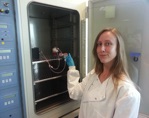What Doctors Say
Biologist - specialist in general pathology -
Dr Susanna Penco
Animal experimentation is not only unnecessary but actually holds back medical, biological and scientific progress
Today, in light of emerging technology, I am convinced more than ever that animal experimentation is not only unnecessary but actually holds back medical, biological and scientific progress, because it is based on out-dated methods. In this third millennia, my hope is that modern medicine will be able to cure and prevent disease, especially in view of the current uncertain economic future of social health care. Chronic diseases now weigh heavily upon the economy and as a consequence, on the quality of life of patients and their families and society as a whole. In my view, modern medicine will not be able to make progress as long as we continue to apply a band aid to fix a problem that requires a major overhaul. It is imperative to change mindsets and to allocate significant funding to innovative non animal research methods, to replace out of date methods that were never scientifically validated in the first place.
Animals are not humans, and respond differently to drugs
We've known about the inefficacies of animal experiments for a long while, certainly since the 1960s, so I'm surprised that it hasn't cropped up during my education. The figures are staggering - 94% of the drugs that make it past pre-clinical testing in animals fail at the clinical trials stage because they are either toxic or not effective in humans. There were an estimated 197,000 deaths related to adverse drug reactions in the EU in 2011. The increasing cost of getting a single drug to market (now an estimated average in the range of $1.5bn - $6bn), and the diminishing returns the pharmaceutical industry is seeing are bringing the sector into economic crisis.


Dr Meg Lewis
Testing a drug or treatment on an animal, in order to ascertain if it is safe and effective for use in the human body, is not science
I was interested to discover that there was an increasing number of doctors and scientists questioning the relevance and reliability of animal experiments as models for human disease. I made efforts to meet up with and speak to some of them; many were not open about their beliefs for fear that their careers would suffer.
Aside from the physiological differences, the complexity of humans and the interaction between our diseased state and our psychological and social health can never be underplayed. In my own field, palliative medicine, a lot of my work involves treating patients for pain. I never fail to be struck by how almost identical disease states can cause tremendous pain in one patient and yet no symptoms in another. Drugs can work amazingly well in some but cause intolerable side effects in others. The thought that a pain medicine can be tested on a completely different species with an artificial pain model, eg, sitting an animal on a hot plate in a sterile laboratory environment, and that these can be useful for predicting outcomes in patients with advanced cancer or other diseases, is a depressingly naive one.
Providing GP services - London
Dr Martin Ashby

This issue is not trivial - it is of the utmost national importance
As a clinician (Specialty Doctor in Emergency Medicine) and experienced medical educator (Member of Faculty of Instructors for the Resuscitation Council UK and the Royal College of Surgeons, Advanced Trauma Life Support), my work is based on evidence not anecdote, and underpinned by robust regulatory mechanisms. I must justify treatments and procedures I administer in terms of patient benefit. It is now clear that medical research using animals has failed to demonstrate that it can produce such benefits for humans. Further research expansion will only entrench a method of clinical enquiry that has thus far significantly damaged the advancement of human healthcare. This issue is not trivial - it is of the utmost national importance. Clearly, these issues are complex, and the evidence surrounding them is of urgent national importance. As a doctor, with the interests of my patients my first concern, I believe this evidence should be tested through formal questioning and be taken to a Public Enquiry without further delay.
Clinician - Specaiality Doctor in Emergency Medicine - UK
Dr Adrian Stallwood MB BS

As a cardiologist dealing with human cardiac diseases, it is totally disappointing to see the massive amount of animal usage which can never have translational relevance to the complexity of human heart disease. And to see duplication of animal work already done long before, poor scientific methodology, and a single aspect view which holds back science. And what I see ignores the publication bias towards positive reports.
It is obvious that a drug will work differently in humans than in animals
Professor in Medicine and Senior Heart Transplant Cardiologist
Professor Anne Keogh

If this were an easy problem to solve, it would have been fixed many years ago. As scientists, we are as fractious and conservative as most people are and we resist what we often see as unjustified change. Doctors resent what they perceive as interference in their clinical judgement and civil servants do not welcome wholesale changes in bureaucratic procedure. People also invest large chunks of their lives in particular beliefs and methods, so they will defend them to the last.
All scientists are searching for perfect methods and we should not compromise on this search, so we need a level playing field for funding. It was easy for the guy on his horse to laugh at cars in the 1890s burping and wheezing along the road. By 1905 a V-8 Darracq could exceed 105mph. Given will and money, we can solve any scientific challenge and fairly quickly, too. Human-based systems should receive adequate investment for all our futures and our children's futures.
Human-based systems should recieve adequate investment for all our futures and our children's futures
Dr Michael Coleman
I don't think a very strong case can be made that animal models have never assisted in medical progress or that they will invariably be useless in the future. I do think there is compelling historical and contemporary evidence that animal models are unnecessary for medical progress. In addition, they have been and remain frequently misleading, and their overall scientific value is dubious. Animals are used for purposes in medicine and medical science other than animal models of human conditions, including toxicity testing, reservoirs for infectious organisms, and tissue transplantation. For many of these uses, nonanimal methods have been replacing or should replace animal uses. For those uses for which comparable or superior nonanimal methods are not currently available, it is likely they would be developed if animal use were not an option, since necessity is the mother of invention.
Assistant Professor of Ophthalmology
Dr Kaufman

LATEST TWEETS

One of the reasons we are not developing novel therapies for cancer fast enough is that we have been relying too much on animal models. The fact of the matter is that we cured acute myeloid leukemia in mice back in 1977 and in humans to day we are using the same drugs with absolutely dreadful results. We have to stop studying mice because it is essentially pointless and we have to start studying freshly obtained human cells.
Dr Azra Raza is the director of the MDS Center at Columbia University,
